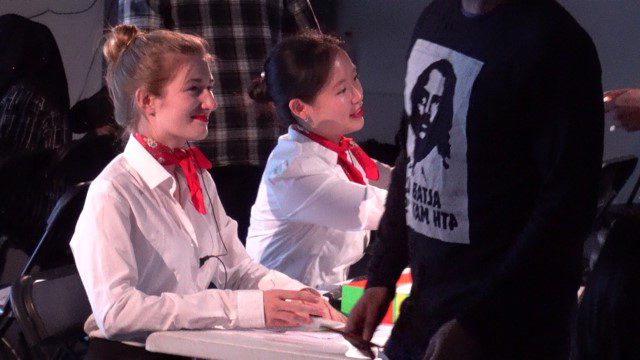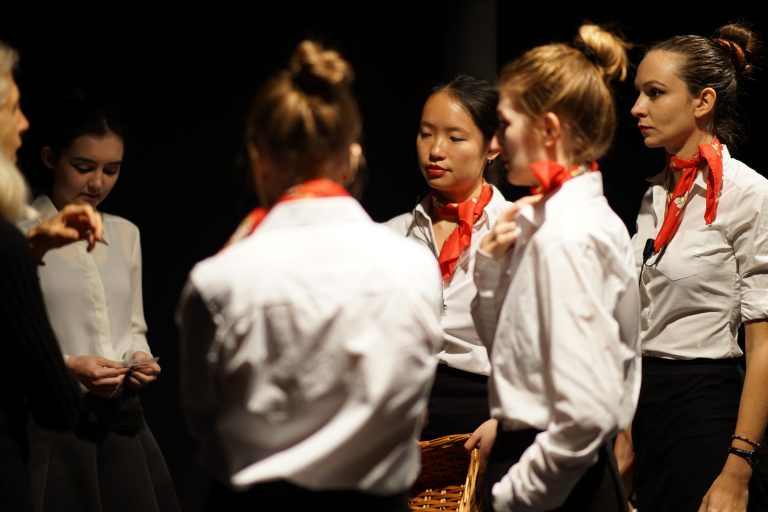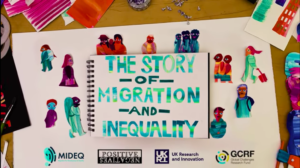Stages: Changing Behaviours through Participatory Performance
Exploring how participatory performance can change attitudes and behaviours that lead to discrimination, violence and social exclusion.

Project Overview
The Stages network is a long-term initiative led by project director Shana Swiss in 2018. It brings together teachers, creatives, and young people in the fields of education, community arts, and social change.
The Stages project develops citizen activism and community engagement with power holders and decision-makers through the creation of participatory theatre performances. In doing so, it promotes conversations within communities to understand what leads to exclusion and what can be used to fight discrimination and embrace difference. Audiences experience first-hand the power that theatre has to clarify issues, challenge attitudes and develop solutions.

Methodology
Stages was launched as a project under the People’s Palace Projects framework to work with a group of Queen Mary University students in the department of Drama in order to create an interactive performance with theatre director Canan Salih. The piece was to be influenced by a current local or national issue, like the Windrush scandal, which was on the news at that time, using the Ten Stages of Genocide (from Genocide Watch, an internatioal movement to prevent and stop genocide).
The participatory performance called Stage 3 (after the third stage in this document – ‘Discrimination’), unravelled the invisible forces behind major socio-political issues, and expanded the understanding that genocide refers not only to a single act of terror towards a particular group (like mass killings as we usually think of it) but is actually a long process which can be thought of as a continuum – from classification and discrimination to polarisation and denial. These stages, if identified early, can be challenged, resisted, and interrupted.
Stage 3 opened the Tafahum project’s (Un)Structured Dialogues event in Tower Hamlets in July 2018. Involving young people and decision-makers in the participatory performance, Stage 3 used the Ten Stages of Genocide as a catalyst to look at the bureaucracy and power of the UK’s naturalisation system.
Toolkit
In early 2022, Stages made available an online toolkit to help develop interactive theatre events in schools, universities and social change organisations throughout the UK and beyond, with aims to scale up nationally. The project also conducts practice-based research to explore the development of community activism and public engagement in the arts for social change and career decisions among Stage 3 student company members.
Addressing the process of being categorised based on race, age and socio-economic background, Stage 3 places participants in positions that question their perceptions of power and powerlessness. The performance at Tafahum generated a passionate conversation about migration, discrimination and belonging, issues that resonated with many of the young people in Tower Hamlets, some of whom had experienced, or were experiencing, the complex UK immigration process. The production is strongly linked to young people’s sense of belonging and citizenship rights.
Stage 3 has formed links with Remembering Srebrenica and Safe Passage who supported a series of dates for Autumn 2018 performances of Stage 3 in communities in the South, South East, London and East regions of England. Stage 3 became an Associate Company of PPP in 2020.

PPP gratefully acknowledges the original 2017–18 pilot No Feedback UnLTD, in partnership with Feedback Theatre, as their original piece No Feedback inspired the idea of using the Ten Stages of Genocide to create theatre events that address inequality and social exclusion. For more information and full credits for the pilot, please see the original project page No Feedback in the Creative Commons.


